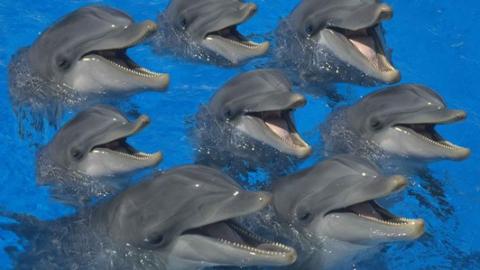Bottlenose dolphins have longest memory among non-humans
To establish how well dolphins could remember their former companions, Dr Bruck collected data from 53 different bottlenose dolphins at six facilities. The sites were part of a breeding consortium that has rotated dolphins and kept records on which ones lived together, going back decades.
Previous studies have established that each dolphin develops its own unique signature whistle that appears to function as a name. Researchers at Scotland’s University of St. Andrews reported in July 2013 that a wild bottlenose dolphin can learn and repeat signatures belonging to other individuals, and answer when another dolphin mimics its unique call.
In the current study, the biologist played recordings of signature whistles to dolphins that had once lived with the animals that made the calls. Determining whether the dolphins recognized their old companions required a methodical comparison of how they responded to familiar calls versus calls belonging to dolphins they had never met.
First, Dr Bruck would play recording after recording of signature whistles that the target dolphins had never heard before. His initial studies showed that these dolphins get bored quickly listening to signature whistles from dolphins they don’t know. Once they were habituated to the unfamiliar calls, Dr Bruck would play a recording of an animal that he knew the target dolphin had lived with.
The familiar calls often would perk up the dolphins and elicit an immediate response. To check that the response was the result of recognition, Dr Bruck also would play a test recording of an unfamiliar bottlenose that was the same age and sex as the familiar animal. All the behavior was scored according to how quickly and to what degree the animals responded. A clear pattern emerged in the data – compared with unfamiliar calls, dolphins responded significantly more to whistles from animals they once knew, even if they had not heard the calls in decades.
In one notable example, Dr Bruck played a recording of a female dolphin named Allie, who currently lives at the Brookfield Zoo, for Bailey, a female now in Bermuda. The pair had last lived together at Dolphin Connection in the Florida Keys when Allie was 2 and Bailey was 4. But 20 years and six months after their last contact, Bailey still recognized the recording of Allie’s signature whistle.
That kind of performance after decades apart was typical, leading Dr Bruck to conclude that dolphins maintain lifelong memories of each others’ whistles. In the wild, bottlenose dolphins have an average life expectancy of around 20 years, though longer-lived individuals can survive up to 45 years or more. Another big question this study raises is how similar dolphins’ signature calls are to human words and names.
So far no one has been able to test what signature whistles signify in a dolphin’s mind. “We know they use these signatures like names, but we don’t know if the name stands for something in their minds the way a person’s name does for us. We don’t know yet if the name makes a dolphin picture another dolphin in its head.” “For the next round of research, that’s my goal – show whether the call evokes a representational mental image of that individual.”

